Congo's army says M23 rebels shelling border town
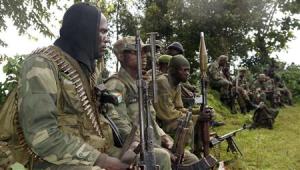
KINSHASA (Reuters) - Congo's army accused rebels of shelling a border town on Monday and said it showed the M23 group's declaration of a ceasefire over the weekend was worthless.
The rebels, however, said government forces had attacked their positions in the steep, forested hills along the Ugandan frontier with heavy weapons fire on Monday morning.
"This is not fighting, it is bombs launched by M23 targeting the population of Bunagana," Congo army spokesman Colonel Olivier Hamuli said by phone.
"They are targeting civilians. The call for a ceasefire was a lie," Hamuli said, adding Congo's military would pursue the rebels.
The army has in recent weeks expelled M23 from towns they had occupied across eastern Congo, making mediators hopeful of a deal to end the conflict.
However the latest violence, which comes as South Africa hosts leaders from the Great Lakes region and southern Africa to try to push the peace process forward, underlines the gulf that remains between the Kinshasa government and the rebels.
Uganda said some of the artillery launched from inside Congo had landed on its territory but that it was still unclear who had fired the shells.
An U.N. aid worker on the Ugandan side of the border said thousands of residents were fleeing the area.
"We were 4 km from the border and the explosions were so bad we had to pull back. The streets are full of people running from the fighting," said the U.N. refugee agency's representative in Uganda, Lucy Beck.
(Reporting by Pete Jones in Kinshasa and Elias Biryabarema in Kampala; Writing by Richard Lough, editing by Elizabeth Piper)
The rebels, however, said government forces had attacked their positions in the steep, forested hills along the Ugandan frontier with heavy weapons fire on Monday morning.
"This is not fighting, it is bombs launched by M23 targeting the population of Bunagana," Congo army spokesman Colonel Olivier Hamuli said by phone.
"They are targeting civilians. The call for a ceasefire was a lie," Hamuli said, adding Congo's military would pursue the rebels.
The army has in recent weeks expelled M23 from towns they had occupied across eastern Congo, making mediators hopeful of a deal to end the conflict.
However the latest violence, which comes as South Africa hosts leaders from the Great Lakes region and southern Africa to try to push the peace process forward, underlines the gulf that remains between the Kinshasa government and the rebels.
Uganda said some of the artillery launched from inside Congo had landed on its territory but that it was still unclear who had fired the shells.
An U.N. aid worker on the Ugandan side of the border said thousands of residents were fleeing the area.
"We were 4 km from the border and the explosions were so bad we had to pull back. The streets are full of people running from the fighting," said the U.N. refugee agency's representative in Uganda, Lucy Beck.
(Reporting by Pete Jones in Kinshasa and Elias Biryabarema in Kampala; Writing by Richard Lough, editing by Elizabeth Piper)
DR Congo pounds rebels despite truce call
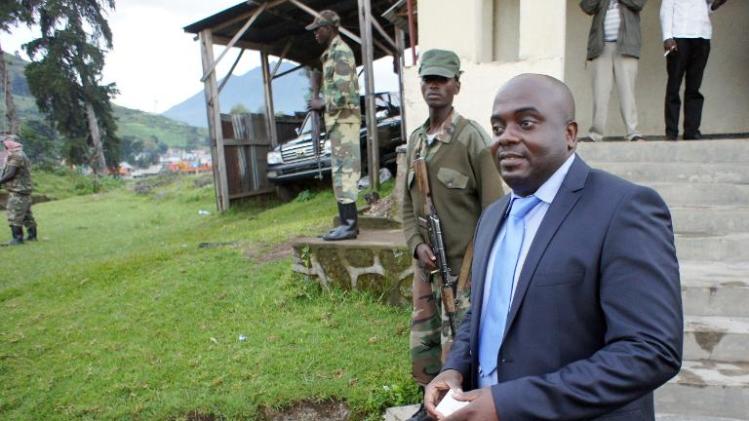
Ntamugenga (DR Congo) (AFP) - Democratic Republic of Congo's army on Monday pounded the remaining hilltop positions of M23 rebels in the country's troubled east despite a truce call by the beleaguered insurgents.
Troops used heavy arms to attack the estimated 200 diehard fighters holed up in the hills after a military offensive forced them from their last stronghold last week.
The fresh assault came a day after the leader of the beleaguered rebels, M23 president Bertrand Bisimwa, called for a ceasefire.
"We order all the forces of the Congolese revolutionary army to immediately end hostilities with the armed forces of the Democratic Republic of Congo (FARDC)," Bisimwa said in a statement on Sunday.
He said his aim was to "allow the continuation of the political process" with Kinshasa in a bid to end the insurgency rocking the long-troubled region since April 2012.
Bisimwa urged rebel chiefs to "ensure the strict observance of this order by elements under their command."
But on Monday, the M23 said in a statement that troops had launched a new assault using "heavy arms."
The order was issued amid fierce fighting in the mountainous region bordering Uganda and Rwanda, where the army has pinned the rebels who fled to the hills after their base was seized Wednesday in the town of Bunagana, about 80 kilometres (50 miles) north of the regional capital Goma.
According to AFP correspondents in Ntamugenga, close to the battle zone, the fighting raged for about eight hours on Sunday and had appeared to intensify after the ceasefire order.
"We are pounding Mbuzi," one of three mountains in eastern DR Congo where the rebels are hiding, General Lucien Bahuma told AFP by telephone early Sunday. "After the artillery we will send in the troops."
A DR Congo captain, speaking anonymously, said the army was "claiming back the hills. There is shooting in the mountains of Ntamugenga, Mbuzi and Runyonyi. The rebels are fleeing."
The lush green hilly region has been rocked by heavy fighting for the past 10 days as FARDC troops battle to stamp out the insurgency once and for all in the restive, mineral-rich North Kivu province.
The clashes have forced thousands from their fields and homes, and aid agencies estimate about 10,000 refugees have streamed into Uganda.
The head of the UN mission in DR Congo (MONUSCO), Martin Kobler, said he considered the M23 order "a good first step", adding that it "must be followed by declaring an end to the rebellion."
While the UN forces have not directly participated in the battle since October 25 against the M23 rebels, they have supported the Congolese army with logistics, intelligence and planning.
The M23 movement was founded by ethnic Tutsi former rebels who were incorporated into the Congolese army under a 2009 peace deal but then mutinied in April 2012, claiming that the pact had never been fully implemented.
At their strongest in November last year, M23 marched into Goma, a mining hub and city of one million people, and took control for 10 days, before regional leaders persuaded them into fresh peace talks.
But the stop-start talks fell apart last month when Kinshasa refused amnesty for about 80 rebel leaders and the DR Congo army -- backed by a special United Nations force -- went on the attack in a bid to end the rebellion.
Troops used heavy arms to attack the estimated 200 diehard fighters holed up in the hills after a military offensive forced them from their last stronghold last week.
The fresh assault came a day after the leader of the beleaguered rebels, M23 president Bertrand Bisimwa, called for a ceasefire.
"We order all the forces of the Congolese revolutionary army to immediately end hostilities with the armed forces of the Democratic Republic of Congo (FARDC)," Bisimwa said in a statement on Sunday.
He said his aim was to "allow the continuation of the political process" with Kinshasa in a bid to end the insurgency rocking the long-troubled region since April 2012.
Bisimwa urged rebel chiefs to "ensure the strict observance of this order by elements under their command."
But on Monday, the M23 said in a statement that troops had launched a new assault using "heavy arms."
The order was issued amid fierce fighting in the mountainous region bordering Uganda and Rwanda, where the army has pinned the rebels who fled to the hills after their base was seized Wednesday in the town of Bunagana, about 80 kilometres (50 miles) north of the regional capital Goma.
According to AFP correspondents in Ntamugenga, close to the battle zone, the fighting raged for about eight hours on Sunday and had appeared to intensify after the ceasefire order.
"We are pounding Mbuzi," one of three mountains in eastern DR Congo where the rebels are hiding, General Lucien Bahuma told AFP by telephone early Sunday. "After the artillery we will send in the troops."
A DR Congo captain, speaking anonymously, said the army was "claiming back the hills. There is shooting in the mountains of Ntamugenga, Mbuzi and Runyonyi. The rebels are fleeing."
The lush green hilly region has been rocked by heavy fighting for the past 10 days as FARDC troops battle to stamp out the insurgency once and for all in the restive, mineral-rich North Kivu province.
The clashes have forced thousands from their fields and homes, and aid agencies estimate about 10,000 refugees have streamed into Uganda.
The head of the UN mission in DR Congo (MONUSCO), Martin Kobler, said he considered the M23 order "a good first step", adding that it "must be followed by declaring an end to the rebellion."
While the UN forces have not directly participated in the battle since October 25 against the M23 rebels, they have supported the Congolese army with logistics, intelligence and planning.
The M23 movement was founded by ethnic Tutsi former rebels who were incorporated into the Congolese army under a 2009 peace deal but then mutinied in April 2012, claiming that the pact had never been fully implemented.
At their strongest in November last year, M23 marched into Goma, a mining hub and city of one million people, and took control for 10 days, before regional leaders persuaded them into fresh peace talks.
But the stop-start talks fell apart last month when Kinshasa refused amnesty for about 80 rebel leaders and the DR Congo army -- backed by a special United Nations force -- went on the attack in a bid to end the rebellion.
=============================================
Congo's M23 rebels declare ceasefire but shelling continues
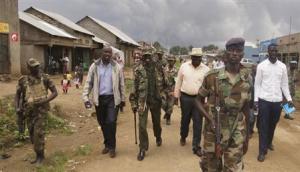
Congolese leaders of the M23 rebels are escorted in Bunagana, in eastern Democratic Republic of Congo, …
By Kenny Katombe
RUNYONI, Democratic Republic of Congo (Reuters) - Congo's M23 rebels declared a ceasefire on Sunday after a string of defeats by government forces, but clashes with the Congolese army continued in the steep, forested hills to where the rebels have withdrawn.
The army has in recent weeks driven rebels from towns they had occupied across eastern Congo, making mediators optimistic for a deal to end the conflict, the most serious since a major Congolese war ended a decade ago.
Uganda, which has led attempts to end the rebellion, has called for both sides to stop fighting. A spokesman for Congo's government called the rebel statement "a step in the right direction" but said it was waiting to see if the ceasefire was implemented on the ground.
"We call on the facilitator of the Kampala peace talks to immediately put in place a mechanism to monitor the ceasefire," the rebels said in statement.
However, a Reuters journalist near the frontline at Runyoni, in North Kivu province, said the two sides were shelling each other's positions on Sunday afternoon.
"With this kind of thing there is always a delay between the order being given and the reality on the ground," said government spokesman Lambert Mende. "In any case the army will continue to pursue the demobilization and disarmament of the rebels."
M23 was launched last year by fighters complaining that the terms of a 2009 peace deal ending a previous rebellion in the mineral-rich east had not been honored.
Last November, the rebels seized Goma, the capital of North Kivu, overrunning government troops and marching past U.N. peacekeepers.
That prompted an overhaul of the army and a strengthening of the U.N. mission's force and mandate. Intense pressure was applied to neighboring Rwanda not to back the rebels, something it denied doing.
SWIFT GAINS BY ARMY
Congo's U.N.-backed army made swift gains after it went on the offensive when peace talks broke down 10 days ago.
Rebel fighters this week abandoned Bunagana, their last stronghold in the eastern province, and have withdrawn into the hills and forests around Congo's border with Uganda and Rwanda where the rebellion was launched last year.
Heavy fighting has eased as the rebels pulled back but the army said it shelled rebel positions on Saturday to encourage remaining fighters to surrender.
Colonel Olivier Hamuli, a spokesman for Congo's army, said late on Saturday that the army was slowly advancing and had captured three hilltop positions from the rebels, who were now confined to the hills of Runyoni, Mbuzi and Tshanzu.
Congo's government has dispatched senior negotiators to talks in Uganda but the army is keen to finish off the rebellion, the last in a series of uprisings led by Congolese Tutsis and linked to Rwanda.
In a sign of optimism for an end to violence that has killed millions through conflict and related disease, Russ Feingold, U.S. special envoy for the Great Lakes region of Africa, had said a peace deal could be reached as soon as this weekend.
But writing in South Africa's Sunday Independent newspaper, South African military and defense analyst Helmoed Romer Heitman cautioned that it might be "too early to celebrate" an end to the rebellion.
"Remember that M23 essentially pulled out of positions as (government) forces approached; they were not driven out in combat. Therein may lie a fatal over-optimism," he wrote.
"The key point is that M23 is a guerrilla force and a core tenet of guerrilla war is to side-step a stronger enemy."
Even if a deal is done, deep-rooted issues ranging from ethnic rivalries and conflicts over land and minerals to a weak national government and meddling by more powerful neighbors must be tackled to break the cycles of violence in Congo.
(Additional reporting by Pete Jones in Kinshasa and Pascal Fletcher in Johannesburg; Writing by David Lewis; editing by Robin Pomeroy and Barry Moody)
RUNYONI, Democratic Republic of Congo (Reuters) - Congo's M23 rebels declared a ceasefire on Sunday after a string of defeats by government forces, but clashes with the Congolese army continued in the steep, forested hills to where the rebels have withdrawn.
The army has in recent weeks driven rebels from towns they had occupied across eastern Congo, making mediators optimistic for a deal to end the conflict, the most serious since a major Congolese war ended a decade ago.
Uganda, which has led attempts to end the rebellion, has called for both sides to stop fighting. A spokesman for Congo's government called the rebel statement "a step in the right direction" but said it was waiting to see if the ceasefire was implemented on the ground.
"We call on the facilitator of the Kampala peace talks to immediately put in place a mechanism to monitor the ceasefire," the rebels said in statement.
However, a Reuters journalist near the frontline at Runyoni, in North Kivu province, said the two sides were shelling each other's positions on Sunday afternoon.
"With this kind of thing there is always a delay between the order being given and the reality on the ground," said government spokesman Lambert Mende. "In any case the army will continue to pursue the demobilization and disarmament of the rebels."
M23 was launched last year by fighters complaining that the terms of a 2009 peace deal ending a previous rebellion in the mineral-rich east had not been honored.
Last November, the rebels seized Goma, the capital of North Kivu, overrunning government troops and marching past U.N. peacekeepers.
That prompted an overhaul of the army and a strengthening of the U.N. mission's force and mandate. Intense pressure was applied to neighboring Rwanda not to back the rebels, something it denied doing.
SWIFT GAINS BY ARMY
Congo's U.N.-backed army made swift gains after it went on the offensive when peace talks broke down 10 days ago.
Rebel fighters this week abandoned Bunagana, their last stronghold in the eastern province, and have withdrawn into the hills and forests around Congo's border with Uganda and Rwanda where the rebellion was launched last year.
Heavy fighting has eased as the rebels pulled back but the army said it shelled rebel positions on Saturday to encourage remaining fighters to surrender.
Colonel Olivier Hamuli, a spokesman for Congo's army, said late on Saturday that the army was slowly advancing and had captured three hilltop positions from the rebels, who were now confined to the hills of Runyoni, Mbuzi and Tshanzu.
Congo's government has dispatched senior negotiators to talks in Uganda but the army is keen to finish off the rebellion, the last in a series of uprisings led by Congolese Tutsis and linked to Rwanda.
In a sign of optimism for an end to violence that has killed millions through conflict and related disease, Russ Feingold, U.S. special envoy for the Great Lakes region of Africa, had said a peace deal could be reached as soon as this weekend.
But writing in South Africa's Sunday Independent newspaper, South African military and defense analyst Helmoed Romer Heitman cautioned that it might be "too early to celebrate" an end to the rebellion.
"Remember that M23 essentially pulled out of positions as (government) forces approached; they were not driven out in combat. Therein may lie a fatal over-optimism," he wrote.
"The key point is that M23 is a guerrilla force and a core tenet of guerrilla war is to side-step a stronger enemy."
Even if a deal is done, deep-rooted issues ranging from ethnic rivalries and conflicts over land and minerals to a weak national government and meddling by more powerful neighbors must be tackled to break the cycles of violence in Congo.
(Additional reporting by Pete Jones in Kinshasa and Pascal Fletcher in Johannesburg; Writing by David Lewis; editing by Robin Pomeroy and Barry Moody)
========================
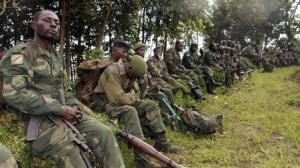

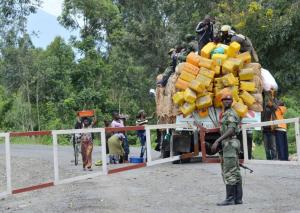
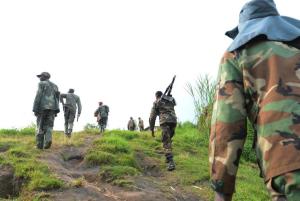
No comments:
Post a Comment